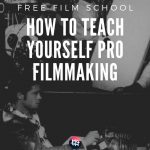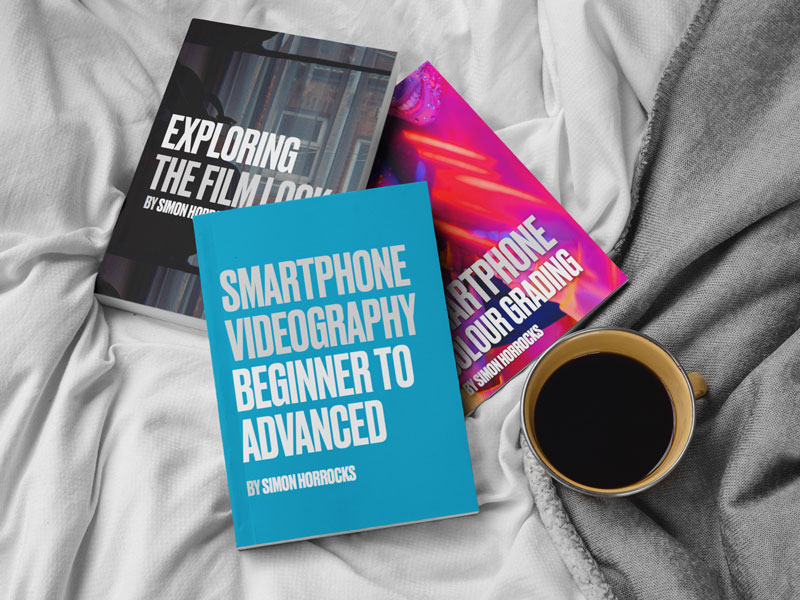FREE Film School: How To Teach Yourself Pro Filmmaking
In this article, I’ll tell you how to become a better filmmaker without owning a single piece of filmmaking equipment!
I never went to film school. Instead, I taught myself how to make films. I shot a feature film with a camcorder and the film was shown at a prestigious festival in Germany, alongside films made by professional crews with budgets of $1m or more.
At that festival I met indie filmmaker Peter Strickland. We were the only two British filmmakers with films at the festival. His film – Berberian Sound Studios – cost over $500,000 to make. Mine cost £4000. Neither of us went to film school.
Of course, I can’t tell you how to become an expert filmmaker in a few articles. But what I can do is give you some tips on how to teach yourself. So here are some simple steps you can try.
Start thinking like a filmmaker
All filmmakers start out as film watchers. That’s how we got inspired. We saw an amazing film as a child and something in our heads clicked.
Movies are magic and watching one that for some reason connects with us more than others can change our lives. In my case, I decided I wanted to be a film director. I wanted to somehow be involved in the magical process. Nothing would be more fulfilling (I thought) than creating a world and projecting it onto a big screen.
I was 7 years old.
But making the journey from film watcher to filmmaker took about another 35 years. That’s because being a film watcher is very different to being a filmmaker. You have to think differently.
Step one: watch films differently
You need to make the journey from film watcher to filmmaker. To get there, the intermediary step is to become a film analyser.
Legendary auteur Orson Welles never went to film school either. But he still secured a 5 picture deal with a studio, at the age of 25, without having directed a film before.
Welles said that his preparation before making Citizen Kane was to watch John Ford’s Stagecoach 40 times.
“After dinner every night for about a month, I’d run Stagecoach, often with some different technician or department head from the studio, and ask questions. “How was this done?” “Why was this done?” It was like going to school.” Orson Welles
Bear in mind, Welles had been a star actor, theatre director and radio drama director before, so he wasn’t totally inexperienced. He knew how to tell a story.
But you can see Orson Welles taught himself filmmaking by watching films. In fact, just one film 40 times. And that’s a very good clue as to how a filmmaker is different to a film watcher.
It’s very unlikely you would watch any film 40 or more times as a film watcher. If you haven’t made the step to film analyser yet, you’re most likely like other general movie consumers: you watch hoping to be entertained or to be moved.
In this step, that is the first thing you need to change.
Watching one film over and over
When I worked in a cinema, part of my job was to sit in the auditorium with the audience for every showing of a movie during my shift. As I worked at the BFI IMAX, this often meant seeing the same film over and over. When The Dark Knight exploded into cinemas around the world, the IMAX decided to show the film 24 hours a day to meet audience demand.
After I had seen the film 7 times, I decided I needed to do something to stop myself going crazy. So I started making notes as I watched the film for the 8th time. Then the 9th…
After the 50th showing I stopped counting.
Watching one film over and over is like buying a car, taking it apart and putting it back together to find out how it works. No one would do this unless they wanted to be a professional car mechanic or engineer.
If you seriously want to become a working filmmaker, this is your first test. Can you watch one film more than 20 times, analysing it and taking it apart? Can you stomach that?
If you can, that’s a good sign you have what it takes to become a serious filmmaker.
Changing your brain
“Can I have a new brain, please?”
“Certainly, madam. What kind would you like?”
“I’d love a filmmaker brain, if you have any.”
“How about the JJA MKII? It’s a very popular brain right now.”
Now that you’ve watched your favourite film over 20 times (it doesn’t have to be your favourite film, but perhaps one in the genre you aspire to making) and taken it to pieces, your brain will have started to change. Henceforth, you will never be able to watch films as you did when you were just a happy, relaxed film watcher.
Once you have made the step to film analyser, you will become obsessed with things in films none of your non-filmmaker friends will see. Once you start rambling on about the use of the 2:1 aspect ratio in Stranger Things only to see your friends have blank, uninterested looks, you know you are now watching a different film to them.
But you’re seeing films differently and your brain is changing into a filmmaker’s brain. And that’s without shooting a single frame of film or video.
Warning: do not spend too long as a film analyser. If you do, you will be in danger of becoming a film critic. And that would be a terrible tragedy. Does this warning come too late? Then please send my condolences to your family and loved ones.
Just kidding film critics! You’re doing a great job…
FREE Film School: Week One
Welcome to your free school of self-learning. This week’s task is to pick a film and watch it at least once per day. Analyse it, make notes, get curious.
If you see something you want to know more about, try searching online. See if other film analysers are talking about it. Get involved in the conversation.
If you follow this simple task, by the end of the week your brain will be a little bit different to what it is today. For a start, films will look different.
Not only that, but the real world will start to look like a series of shooting opportunities.
You’ll see two strangers talking in a cafe and wonder if they need a fill light or if leaving them silhouetted against the window would look better. While your parents are telling you about their caravan holiday in Suffolk, you’ll start dreaming of an epic opening drone shot to set the scene of the road movie version…
Yes, you’ll start thinking like a filmmaker.
FREE Film School: Week Two
Next week I’ll talk about how to turn yourself from a film analyser to a filmmaker. If you don’t want to miss next week’s free film school lesson, make sure to subscribe below.
Read Next: FREE Film School Week Two
Smartphone Video – Beginner to Advanced
If you want to know more about smartphone filmmaking, my book Smartphone Videography – Beginners to Advanced is now available to download for members on Patreon. The book is 170 pages long and covers essential smartphone filmmaking topics:
Things like how to get the perfect exposure, when to use manual control, which codecs to use, HDR, how to use frame rates, lenses, shot types, stabilisation and much more. There’s also my Exploring the Film Look Guide as well as Smartphone Colour Grading.
Members can also access all 5 episodes of our smartphone shot Silent Eye series, with accompanying screenplays and making of podcasts. There’s other materials too and I will be adding more in the future.
If you want to join me there, follow this link.
Simon Horrocks
Simon Horrocks is a screenwriter & filmmaker. His debut feature THIRD CONTACT was shot on a consumer camcorder and premiered at the BFI IMAX in 2013. His shot-on-smartphones sci-fi series SILENT EYE featured on Amazon Prime. He now runs a popular Patreon page which offers online courses for beginners, customised tips and more: www.patreon.com/SilentEye




The Dog are my homework 🙂
Thanks Si. Now I have to think of a suitable film to watch for 7 days in a row. My initial choices were Grand Budapest Hotel and Blues Brothers.
Great stuff. Did you manage to catch some multiple viewings, Fuego?
I’m 19 years old. I’m from Iran.
Most of the time I got confused about who I am and stuff like this.
But I know one thing for sure and that is: I want to be an eye for people.
I don’t really know how far can I go .
good luck, keep at it 🙂
Hello again
I have one question about week one
You said analysing and…
Could you explain a little more about it?
What should we analyze?
First lesson and i already feel like I’m gearing up to start shooting. I honestly would love to analyze the matrix, however I’ll go for a short film for now.
This is big and I love it. Am in to learn.
Thanks for Free lessons.
Can’t wait for week 2
thanks! You don’t have to wait for week 2, we already have over 30 weeks of FREE Film School lined up for you!
Wow very unique way to learn thank to you dear Simon
And thanks .